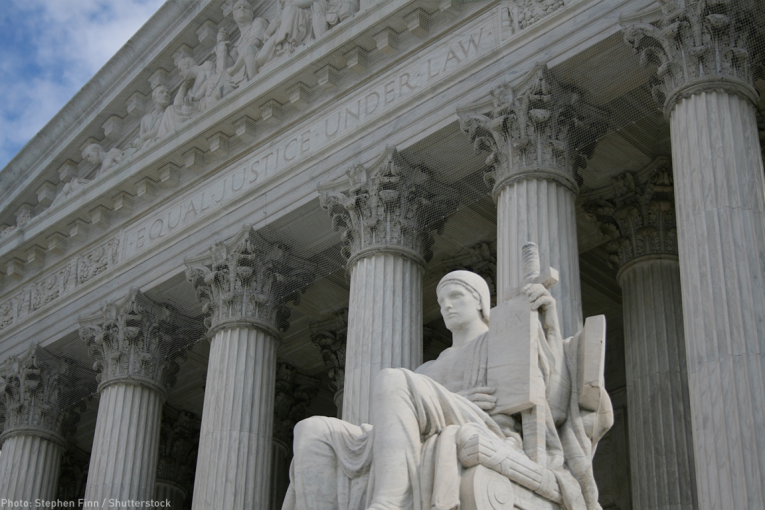

By Linh Nguyen & Metyia Phillips
On May 26, 2020, the Supreme Court refused the Trump Administration’s request to block a lower judge’s trial ruling to release over 800 medically vulnerable incarcerated people from the Elkton Federal Correctional Institution in Ohio.
Last month, four prisoners filed a class-action lawsuit claiming the conditions that they were living in violated the Eighth Amendment’s standard of no cruel and unusual punishment. The ACLU (American Civil Liberties Union) explained that “prisoners were unable to take the most rudimentary efforts to protect themselves.” The lawsuit came about after the outbreak of COVID-19 caused 9 deaths in this low-security federal prison, leaving many fearing for their lives.
Joseph Mead, Cooperating Attorney for the ACLU of Ohio, explained why inmates should be released according to the Eighth Amendment. He said, “Prisons are not Constitution-free zones. People who live and work in prisons should not be forced to face unnecessary risk of death and disease.” On the basis of the Eighth Amendment, since prisoners are not in an environment to effectively protect themselves from death and disease, they should be released from prison.
Within the confines of prison, social distancing is nearly impossible. There is not enough room for six feet between prisoners to follow social distancing guidelines and inmates lack the tools for basic hygiene. There is also no PPE (personal protective equipment) for all inmates, meaning that they are already in close quarters and if one inmate becomes ill it’s easy for the disease to spread among other inmates.
In the class-action lawsuit, David Corey, Senior Staff Attorney at ACLU of Ohio, stated, “We’ve already seen that prisons are tinderboxes for COVID-19 because people are forced to exist in close, shared spaces for eating, sleeping, and bathing.” He cites this as one of the main reasons why medically vulnerable prisoners need to be compassionately released for safety purposes.

On April 22, 2020, the Ohio district court issued an order to the Bureau of Prisons to assess high-risk incarcerees for transfer out of the prison facility, whether by early release or transfer into another facility. However, since that order was issued, no action had been taken as none of the identified high-risk incarcerees had been released or moved yet.
A U.S. District Judge in Ohio, James S. Gwin, on May 19, 2020, ordered officials to move faster in removing those who are most vulnerable from the prisons. The officials of the prison requested a stay because they believed that Judge Gwin’s ruling threatened public safety. The stay was turned down in local courts, so Solicitor General Noel J. Francisco asked the Supreme Court to intervene.
In their brief opposing the stay of the district court’s order, the incarcerees emphasized that there were around 135 active COVID-19 cases among incarcerees and eight active cases among staff members at the Elkton prison. They argued that the only way to lower the risk of viral spread between incarcerees and staff is to transfer incarcerees out of the facility. They argued that the district court’s order did not mandate the release or transfer of any incarcerated people. Rather, the order merely instructed the BOP (Bureau of Prisons) to explain why no one had been moved or transferred yet.
They noted that the government’s “real complaint” was with the May 19 order, though the government had not actually appealed yet nor asked the court to block that order. Furthermore, they argued that a stay of the April 22 order would further violate the Eighth Amendment, so the incarcerees are likely to win.
“By forcing prisoners to live in overcrowded congregate living spaces and refusing to take available steps to meaningfully reduce that risk, the Government is continuing to confine prisoners at Elkton in a manner that poses a known, heightened risk of infection suffering and death from COVID-19,” their brief states. “The Eighth Amendment prohibits the unnecessary exposure to a heightened risk of infection, and as both the District Court and Sixth Circuit recognized, Petitioners are likely to prevail on their argument that this risk is objectively serious and that the Government subjectively knew of this risk and refused to take reasonable steps to reduce it.”
On May 26, 2020, the Supreme Court responded in a one-page order.
“The Government has not sought review of or a stay of the May 19 order in the U.S. Court of Appeals for the Sixth Circuit,” the order decreed. “Particularly in light of that procedural posture, the Court declines to stay the District Court’s April 22 preliminary injunction without prejudice to the Government seeking a new stay if circumstances warrant.”
According to the order, the Court denied the federal government’s request to stay the district court’s order to expedite the release of high risk incarcerated individuals. However, this decline is temporary as the decision of the case is still pending, so long as the government can present more evidence to justify a new stay.
Justices Clarence Thomas, Samuel Alito and Neil Gorsuch indicated that they would have granted the government’s stay request.
To sign up for our new newsletter – Everyday Injustice – https://tinyurl.com/yyultcf9
